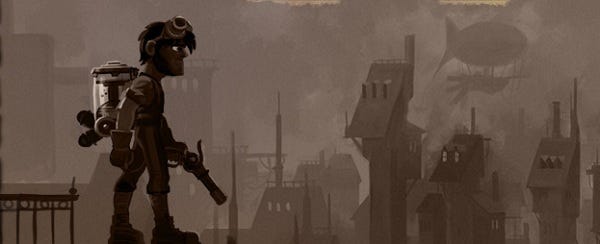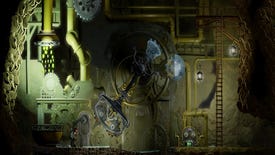Wot I Think: Vessel
Water beauty
I’ve been charmed by physics puzzler Vessel ever since I first saw its liquids in action, sloshing, spilling and trickling around as gravity intends. I wanted to be set loose in its steampunk world, to jump in puddles and catch raindrops in a bucket. Vessel had different ideas. It would let me play, but it also wanted me to think and it wanted me to think hard. Here's wot I think about that.
I’m still in love with the way liquids move in this game, whether they’re streaming out of a pipe and causing a basin to overflow, droplets bouncing along the floor and running down surfaces, or being fired from the hose that the player fits together early in proceedings, with its various nozzles allowing for different shapes and strengths of emission. I’d happily spend a few hours just playing around, jumping in puddles and singing in the rain, the city and the zeppelins moored to its towers my backdrop.
Vessel isn’t about splashing about in the bathtub with a rubber duck though, it’s more like being the plumber called in to fix the faucets. It’s a thinking, working man’s game and all the cleverness of the technology goes toward the invention of puzzles to be solved, with only the occasional area devoted to pure play.
I’ve been flummoxed more times in the last few days than I’m entirely comfortable admitting and now that I’ve finished the game, I’m still not convinced it’s as hard as I made it out to be. It follows the pattern of introducing basic elements at the beginning and then adding new twists to them as progress is made. There’s rarely a moment when everything you need to solve a room isn’t either in your possession or clearly visible on the screen. I’ll go further in fact; there’s rarely a moment when everything in your possession and clearly visible on the screen isn’t necessary to solve a room.
Despite the detail of the world, almost everything has a purpose. Levers, pipes, cogs, chain-pulls, it’s an industrial steampunk kind of a place, and most of the machinery does something, or at least it will do something once you repair or activate it. You see, Vessel is a game about broken things.
The player controls M Arkwright, inventor of all kinds of wonderful tools, but most famous for his creation of fluros, liquid automatons that can perform basic tasks in factory environments and, when their work is done, can easily be popped in a container and transported elsewhere. They don’t directly obey commands but rather have behaviour types, from the first you meet which are attracted by lights and an therefore be encouraged to stand on lit pressure points to the more complex evolutions that you’ll meet throughout the dozen or so hours the game takes to play through.
But I was talking about broken things and the Fluros are broken in a way. They’ve taken over Arkwright’s lab having fallen into a routine that is causing them to constantly add to their own numbers. They’re created from seeds, which look like fist-sized eyes; lob one into a container filled with water and the liquid forms into a vaguely humanoid shape around the water and then begins to follow its work routine.
As the game progresses, Arkwright’s collection of seeds grows, allowing him to create what are essentially moving puzzle parts with a specific function. Need to activate a lever that’s unreachable? You’ll have to get a seed close to it somehow and then use your hose to spray enough of the required liquid close enough to bring the Fluro to life.
Although there are caves, giant machine rooms and overground areas with a gorgeous city backdrop to connect every puzzle, Vessel is a series of puzzles. Indeed, the second major area, a gargantuan factory, allows you to travel to any of the previously visited areas in need of repair rather than traipsing back and forth. It’s an option I wish the upgrade system had followed too. As it stands, protoplasm must be collected to upgrade Arkwright’s kit and then that protoplasm must be inserted into a giant machine, a dial on which selects the desired piece of equipment. Once the necessary amount of fuel has been dropped down the chute, a wheel must be cranked to produce the actual upgrade.
It’s admirable, in a way, to make everything that happens in the game happen in the world, avoiding use of menus and shortcuts as much as possible, particularly since the world is so beautifully functional, but it goes too far at times. The mild frustration probably wouldn’t be there if navigating each screen was smoother, but jumping isn’t always entirely accurate and Arkwright often feels a little disconnected from the environment.
Throughout the game there have been times when a spark has ignited somewhere in my skull, ricocheted about for a while and then somehow transformed into the solution I’ve been looking for. Vessel is never unfair, always ensuring you’ve been shown a mechanic before expecting you to solve a room with it, but there were times when I had to walk away and come back later with fresh eyes (I keep them in the refrigerator).
Mostly, it’s a case of moving either yourself or a certain quantity of liquid from one place to another, maybe having turned it into steam first. Once I’d figured out the solution to a puzzle though, I found myself, more and more, wishing that I could activate the necessary components by clicking them with a cursor rather than running back and forth, jumping up and down, falling, being too slow, trying again.
The puzzles are frequently so ingenious and their solutions so satisfying and, often, splendid to watch in motion that the clumsy clomping back and forth of Arkwright, no matter how handsome his sideburns, feels at odds with the brilliant design of the rest. It’s not enough of an annoyance to detract greatly from what is a remarkably well-built game in every other way, with particular praise reserved for the art design and the haunting music, which is the major contributor to the game’s pervading sense of mystery and melancholy.
The Fluros though, that’s where the real magic is. While their actions are mostly predetermined and basically programmed, both in the fiction and the game design, there is an incredible amount of character in each and every one. I still feel guilty when I get in their way and they collide with me, collapsing into a pool, the semblance of life gone. And then there are the times that seeds of different types intermingle in lava and water, creating a lurching hybrid that swells, staggers and then dies before it lives.
Vessel is contained in a beautiful world, full of creations that deserve to be seen, experienced and solved. If the way of interacting with that world is sometimes stilted, it is in the end a minor complaint because I’m as impressed with the technology behind the game and its uses as I have been since those early videos. It’s lengthy too and doesn’t repeat itself, always ready with a new piece of equipment or way of thinking about a problem. While it’s less playful than I anticipated, it’s also more thoughtful and if that leads to the occasional frustration, I can take it.
Available now DRM-free for $13.49 direct from Strange Loop through the Humble store back-end (with Steam key) or on Steam at £11.99, with a 10% discount until March 8th. There is also a demo.















